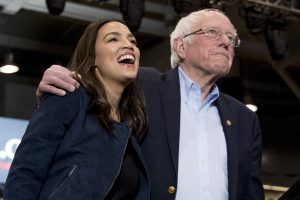 Listen HERE
Listen HERE
Before Bernie and AOC, before Jesse Jackson and George McGovern, there was Henry Wallace, FDR’s vice president, who fought for the soul of the Democratic party in the 1940s. John Nichols tells that story, and links it to today’s battles between progressives and Wall Street Democrats—his new book, out this week, is “The Fight for the Soul of the Democratic Party.”
Also: a new episode of “The Children’s Hour” with Amy Wilenz, stories about Ivanka, Jared, Don Junior, and little Eric–boy are those kids in trouble this week! Amy of course is our Chief Jared Correspondent—and was just awarded a Guggenheim fellowship. 5-7-2020
David Dayen: Save the Postal Service!; Mike Davis: the virus around the world; John Powers: Virus Time TV
 Listen HERE
Listen HERE
s parts of the US reopened their economies, the Trump Administration defunded the W.H.O., and Dr. Micheal Osterholm reminded that the point of flattening the curve was not to keep everyone from getting the virus, it was to spread-out the infection-rate over time – Mike Davis reports.
Next up, we talk with David Dayen of the American Prospect about the need to save the United States Postal Service; he also reports on reasons for the shortage of hospital beds in New York City, the US healthcare system on the whole and Medicare for all.
Plus, John Powers of NPR’s Fresh Air makes his recommendations for virus-time TV watching. 5-7-2020
Mike Davis: Back to Work in the Covid-19 Economy? Plus John Powers on Virus Time TV
 Listen HERE
Listen HERE
Minnesota’s back-to-work plan is a lot better than Georgia’s, Mike Davis says – it requires employers to provide PPE and bans face-to-face activity—i.e. the restaurants, shopping malls, and tattoo parlors that Georgia and South Carolina have opened. Mike’s book The Monster at Our Door examined the avian flu.
Also: John Powers, critic-at-large for Fresh Air with Terry Gross on NPR, recommends “The Good Fight” and “The Bureau” for virus-time TV watching.
4-30-2020
Harold Meyerson: The Virus and the Workers; Joseph Stiglitz: The Virus and the Economy; Katrina vanden Heuvel: the Virus and Solidarity
 Listen HERE
Listen HERE
Nobel Prize-winning economist Joseph Stiglitz says the US has “one of the poorest systems of unemployment insurance in the world”—and that our number one priority should be to keep workers connected to their jobs. His book “People, Power and Profits: Progressive Capitalism for an Age of Discontent” is out now in paperback, with a new preface.
Plus: Harold Meyerson has today’s update in the politics of the coronavirus–and we also talk about about the future of labor after the pandemic.
Also: Katrina vanden Heuvel reports on solidarity with the front-line workers fighting the virus—starting in New York, where people cheer hospital workers coming off their shifts at 7pm every night.
Finally: Where’s Paul Krassner when we need him? 4-30-2020
Joseph Stiglitz: What Workers Need Right Now; plus Katrina Vanden Heuvel on Solidarity
 Listen HERE
Listen HERE
Nobel Prize-winning economist Joseph Stiglitz says the US has “one of the poorest systems of unemployment insurance in the world”—and that our number one priority should be to keep workers connected to their jobs. His book People, Power and Profits: Progressive Capitalism for an Age of Discontent is out now in paperback, with a new preface.
Also: Katrina vanden Heuvel talks about solidarity with the front-line workers fighting the virus—starting in New York, where people cheer hospital workers coming off their shifts at 7pm every night. 4-22-2020
Mike Davis: Coronavirus Around the World; plus Harold Meyerson and Barbara Ehrenreich
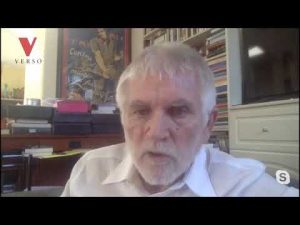 Listen HERE
Listen HERE
Mike Davis argues that the coronavirus crisis is bringing about the fragmentation of Europe and the marginalization of the WHO; he also considers the danger to Africa, and whether China will emerge less powerful in the world economy because of the rise of economic nationalism. Mike wrote about the avian flu in ‘The Monster at Our Door.’
Plus Harold Meyerson comments on southern states reopening for business–and also surveys the possible Democratic candidates for vice president.
Also Barbara Ehrenreich reports on her experiment in trying to survive on low wage work. Her classic essay “Nickel and Dimed,” is the lead piece in her new book, a collection of essays titled Had I Known. We recorded this interview when her book Nickel and Dimed was published, in 2002. 4/22/20
Los Angeles Faces Down Covid-19: The Nation
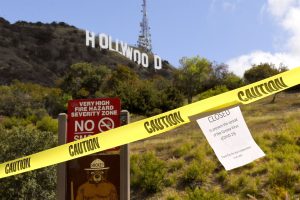 Driving past the Fountain Valley hospital south of Los Angeles, you see something new: a huge white tent in what was the parking lot. To Angelenos, it looks something like the tent that appears downtown Beverly Hills for the Vanity Fair Oscar party. But this one, and others like it outside hospitals throughout Southern California, is not a party tent; it’s a temporary structure designed to deal with the overflow of Covid-19 cases at the hospital—a “triage tent.” . . .
Driving past the Fountain Valley hospital south of Los Angeles, you see something new: a huge white tent in what was the parking lot. To Angelenos, it looks something like the tent that appears downtown Beverly Hills for the Vanity Fair Oscar party. But this one, and others like it outside hospitals throughout Southern California, is not a party tent; it’s a temporary structure designed to deal with the overflow of Covid-19 cases at the hospital—a “triage tent.” . . .
continued at TheNation.com, 4-16-2020, HERE
Mike Davis: Is Coronavirus Ushering in a New World Order? plus Barbara Ehrenreich on low-wage work
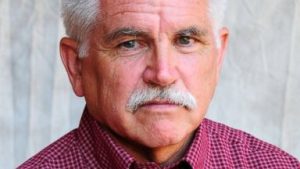 Listen HERE
Listen HERE
Mike Davis talks about the fragmentation of Europe, the marginalization of the WHO, the danger to Africa, and whether China will emerge less powerful in the world economy because of the rise of economic nationalism. Mike wrote about the avian flu in The Monster at Our Door.
Also Barbara Ehrenreich reports on her experiment in trying to survive on low wage work. Her classic essay, “Nickel and Dimed,” is the lead piece in her new book, a collection of essays titled Had I Known. We recorded this interview when Nickel and Dimed was published, in 2002. 4-16-2020
The Good News from Wisconsin: John Nichols; plus Harold Meyerson on Bernie and Biden
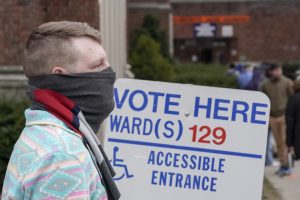 Listen HERE
Listen HERE
Despite massive Republican efforts to prevent Democrats from voting in the Wisconsin primary, the Democrats won–by a huge margin. John Nichols explains how they did it — and the implications for November.
Also: Harold Meyerson comments on Bernie’s endorsement of Biden on Sunday – and the skepticism of some of Bernie’s supporters about Biden, as well as the apparent reluctance of some progressive leaders to join Bernie in the endorsement. 4-16-2020
Set the Night on Fire: the LA Free Press – LA Review of Books
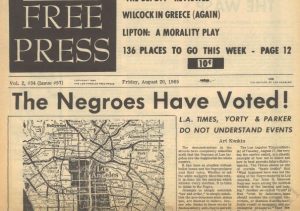 The underground press of the Sixties is often described as self-indulgent; critics said it “trampled the tenets of accuracy and fairness,” while the mainstream media of the era is often portrayed as bland and cautious, and as practicing a phony objectivity. That was not true of the newspaper landscape in Los Angeles. The LA Times was firmly and loudly right-wing, while the LA Free Press (the “Freep”), the first underground paper of the era, and the most successful, was often a voice of reason, albeit a passionate one. A simple comparison of the coverage of the 1965 Watts uprising reveals a great deal.. . .
The underground press of the Sixties is often described as self-indulgent; critics said it “trampled the tenets of accuracy and fairness,” while the mainstream media of the era is often portrayed as bland and cautious, and as practicing a phony objectivity. That was not true of the newspaper landscape in Los Angeles. The LA Times was firmly and loudly right-wing, while the LA Free Press (the “Freep”), the first underground paper of the era, and the most successful, was often a voice of reason, albeit a passionate one. A simple comparison of the coverage of the 1965 Watts uprising reveals a great deal.. . .
Excerpt from “Set the Night on Fire: L.A. in the Sixties,” continued at the LA Review of Books HERE

